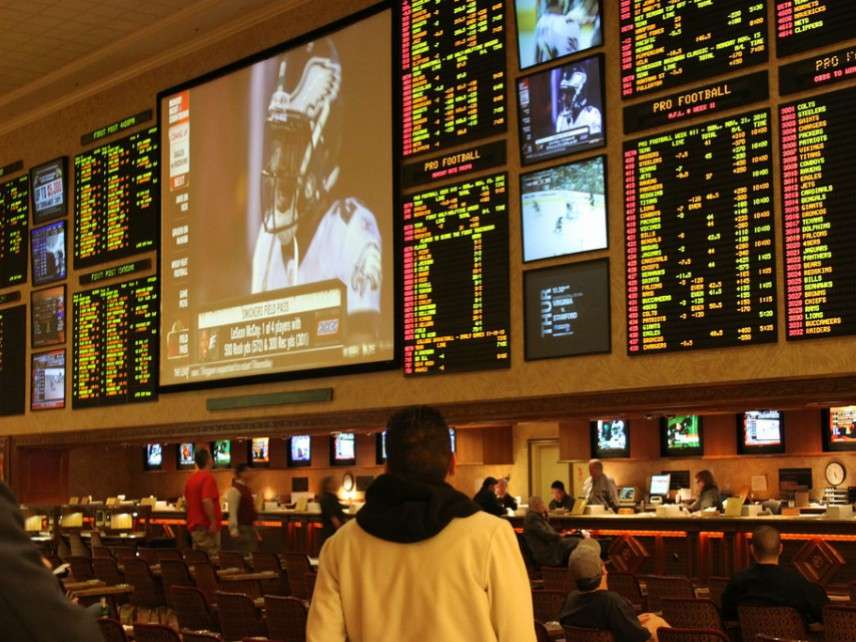If SCOTUS Lets States Legalize Sports Betting, Will They Be Ready?
The black market will continue to thrive if taxes and regulations are too burdensome, a new CEI report warns.

Last December, when the Supreme Court heard oral arguments in Christie v. NCAA, most of the justices seemed inclined to agree that a 1992 law barring states from legalizing sports betting unconstitutionally "commandeers" state officials in service of a federal goal. With the Court expected to issue its decision this spring, Michelle Minton notes in a new report from the Competitive Enterprise Institute, at least 15 states "have enacted regulations for sports gambling within their borders in anticipation of when the federal government steps out of the way." Minton has some tips for those states and any others that hope to replace the black market in sports wagers with a legally regulated industry, a move that promises to protect consumers, control corruption, and raise revenue for the government. Well, two out of three ain't bad.
The Professional and Amateur Sports Protection Act of 1992 (PASPA) effectively gave Nevada a legal monopoly on single-event sports betting. But that does not mean Nevada dominates the market. The $4.9 billion in wagers that legal Nevada bookies accepted last year represented something like 4 percent of all sports betting in the United States, Minton says, meaning the share for illegal bookies was more than 20 times as big. This situation makes game fixing easier to hide, undermining the main goal of PASPA, which the big leagues demanded to protect the integrity of sports. As Minton points out, legalization promotes transparency and data sharing, which make cheating easier to detect.
The sports leagues continue to defend PASPA, which they are asking the Supreme Court to uphold in Christie. But their leaders' perspective on legal sports betting seems to be shifting along with public opinion, which since the 1970s has swung from majority opposition to majority support. "The commissioners of Major League Baseball (MLB) and Major League Soccer have called for examinations into what a regulated sports betting market would look like," Minton notes. "NBA Commissioner Adam Silver has advocated for full legalization, arguing that 'sports betting should be brought out of the underground and into the sunlight where it can be appropriately monitored and regulated.'"
Minton's idea of appropriate regulation includes five major features: "adequate license availability" to ensure there are enough legal businesses to serve the market; "reasonable tax rates," somewhere between 10 and 15 percent of gross gaming revenue, to keep legal operations competitive (and, not incidentally, maximize the government's take); "diverse product offerings," including online options, to attract and keep bettors who would otherwise bring their wagers to illegal bookies; "robust consumer protections," including age, identity, and location identification and self-exclusion lists for problem gamblers; and "regulatory cooperation" among gambling businesses, between gambling businesses and sports leagues, and between states.
Some state plans already run afoul of these guidelines. In Pennsylvania, Minton notes, the legislature "set the tax rate at 34 percent of gross gaming revenues, on top of the $10 million one-time licensing fee. These costs represent an enormous barrier to entry that significantly increases licensed bookies' operating costs. As a result, few operators will be able to enter Pennsylvania's legal market and those that do will not be able to offer rates as competitive as those of their illegal counterparts. This makes it likely that the legal sports betting market in Pennsylvania will fail to thrive, causing consumers to either cross the state line seeking friendlier regulatory environments or continue patronizing illegal operators."
Like the states that have legalized marijuana, states that legalize sports betting have to take into account a black market that will continue to thrive if taxes and regulations in the legal market are too burdensome. "For the last 25 years, the states have lost out on millions in tax revenue they could have collected from sports betting, thanks to a ban pushed by and maintained by sports leagues," Minton writes. "The federal government made a grave error in 1992, when it put the interest of these multi-million dollar businesses over those of the states and their voters. Now that this failed law appears to be nearing its end, states should not repeat Congress' mistake. Instead, state legislatures should begin developing robust regulatory regimes for legal sports betting that emphasize compliance, market competitiveness, and cooperation among all stakeholders."
